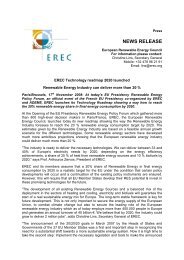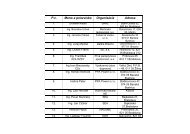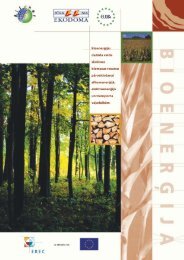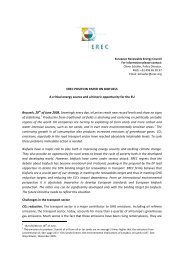CTO Assessment - European Commission
CTO Assessment - European Commission
CTO Assessment - European Commission
Create successful ePaper yourself
Turn your PDF publications into a flip-book with our unique Google optimized e-Paper software.
As for World Bank/GEF funds, in<br />
Poland, a joint implementation initiative<br />
aligned on the Kyoto instruments<br />
to reduce greenhouse gases led<br />
to the replacement of two old coalburning<br />
tanks with a wood fired heating<br />
system.<br />
Economic challenge can otherwise be<br />
overcome if local energy communities<br />
take clear long-term commitment to<br />
massively develop RES (often up to<br />
100%): if investors are well informed<br />
of this plan and of the solid measures<br />
accompanying such an objective, securing<br />
returns on investment, they feel<br />
encouraged to invest in RES.<br />
This is a particularly interesting option<br />
for isolated areas, such as islands<br />
or remote rural areas, which need<br />
otherwise to import conventional energy<br />
at a higher cost than average<br />
cost in the rest of the regions.<br />
The ways to overcome those barriers<br />
at local and regional level can be to<br />
offer tax relief schemes. However this<br />
solution has proven to be successful<br />
for investments by householders in<br />
small scale renewable electricity generators,<br />
but do discourage investments<br />
by developers who do not become the<br />
final owners of the renewable electricity<br />
generators, and therefore cannot<br />
claim the tax relief at the time of<br />
their investment.<br />
In the sector of biofuel transport, the<br />
Directive on biofuels recently adopted<br />
gives the possibility to apply fiscal<br />
advantages for encouraging the use<br />
of renewable energy and improving<br />
energy efficiency in their countries,<br />
therefore this should enable to integrate<br />
RES in the transport sector too,<br />
a sector often still neglected.<br />
A number of financial incentive<br />
schemes are beginning to emerge at<br />
a national or regional level in the EU<br />
in the heating and cooling sector. At<br />
local level new approaches are being<br />
developed, such as the solar ordinances<br />
which have been approved by<br />
numerous Spanish municipalities,<br />
and these could for example be used<br />
as a model to be followed in other<br />
countries.<br />
Beside the above considerations, other<br />
major barriers in developing RESelectricity<br />
in Europe are:<br />
Administrative procedures for planning<br />
and building approvals:<br />
A long and complicated administration<br />
procedure can impede a project<br />
developer to start the implementation<br />
administrative body. Sometimes, the<br />
waiting period can be several years.<br />
A way to overcome this barrier is to<br />
clarify the responsibilities of the different<br />
authorities in charge to give<br />
their opinion during a RES licensing<br />
process, or also to put the custom<br />
through that “no response” received<br />
within a time frame is considered to<br />
be a positive answer. The legislation<br />
framework needs to be adapted accordingly<br />
to issue guarantees of origin,<br />
to ensure transparency of grid<br />
connection costs, and to facilitate<br />
access to electricity grids at each of<br />
the required voltage levels<br />
Technical Barriers – Grid Issue:<br />
In some cases grid access was difficult<br />
to achieve. However, the Directive<br />
on the promotion of electricity<br />
produced from renewable energy<br />
sources in the internal electricity<br />
market has ruled out the path to follow<br />
to accomplish the full integration<br />
of renewable energy in the existing<br />
grid system in Europe. The Directive<br />
requires member states to take the<br />
necessary measures to grant guaranteed<br />
access to the transmission and<br />
distribution of electricity from renewable<br />
energy sources. Where appropriate,<br />
member states have to give priority<br />
access to renewable energy<br />
sources. Furthermore <strong>European</strong>-wide,<br />
network operators will be obliged to<br />
set up transparent cost calculations<br />
for distribution. The fees have to be<br />
non-discriminatory.<br />
Political challenges:<br />
The initial monopoly is still important<br />
in some countries, despite the statements<br />
that the liberalization process<br />
of the electricity market is on-going.<br />
In Varese Ligure, for instance, it was<br />
difficult to install the wind turbines<br />
because of the need to find agreement<br />
with the national utility. Another element<br />
playing a key role in a few countries<br />
is the strong anti-RES lobby such<br />
as coming from the nuclear and other<br />
conventional energy fuels. There is no<br />
need to say that the political will depends<br />
if the local population is sufficiently<br />
motivated to push forward renewable<br />
energy projects.<br />
Lack of public awareness:<br />
All projects demonstrated that the<br />
local level is the driving force, the<br />
Achievements and lessons<br />
35



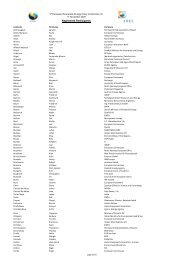
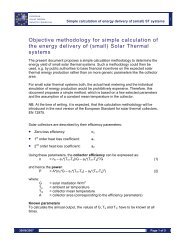

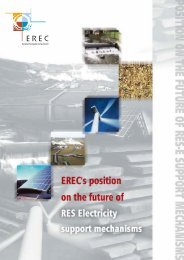
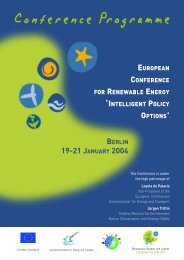
![Energy [R]evolution - Greenpeace](https://img.yumpu.com/47174859/1/184x260/energy-revolution-greenpeace.jpg?quality=85)
